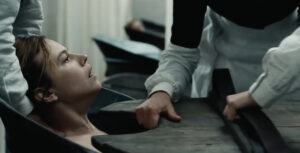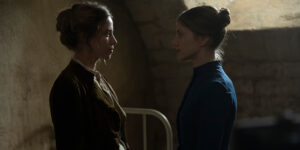TIFF Review: In “The Mad Women’s Ball,” Women Set Themselves Free
Written by: Christopher Llewellyn Reed | September 22nd, 2021

The Mad Women’s Ball (“Le bal des folles”) (Mélanie Laurent, 2021) 3 out of 4 stars.
An adaptation of the eponymous 2019 novel by Victoria Mas, French actress/director Mélanie Laurent’s latest feature is a period piece set in late-19th century Paris, when inconveniently eccentric women could be easily disposed of in asylums designed as playgrounds for sadistic men. Our central protagonist, Eugénie Cléry (Lou de Laâge, The Innocents), though she comes from the upper classes, makes the mistake of revealing that she communicates with spirits. It doesn’t help that she also refuses to follow the rules of ladylike conduct. Off to the Salpêtrière Hospital for treatment, then, though her father’s goal is really more to get her out of the way so she won’t embarrass the family. What follows is something of a Gallic, feminist One Flew over the Cuckoo’s Nest with a supernatural twist, both engaging and disturbing.
Laurent (Oxygen) plays the chief nurse at the hospital, Geneviève Gleizes, but no Nurse Ratched is she. Rather, like all the other women in this affecting drama, she serves at the mercy of men, who have little time for the emotional lives of those they subjugate. Even her own ailing father, whom she tends to lovingly, expresses anger when she reveals that she has allowed Eugénie to act as medium between Geneviève and her own dead sister. Everyone is skeptical, and some refuse to see the truth, even as Eugénie reveals, time and again, that she can, indeed, talk to ghosts. She wishes it were otherwise (the Salpêtrière is no luxury spa) but cannot lie. Meanwhile, the remedies pushed on the helpless patients by the male doctors are designed to create the very symptoms they purport to cure. If they weren’t mad prior to being committed, they soon will be.

Laurent populates the Salpêtrière with a fascinating assortment of characters, mostly from the working class, to whom Eugénie seems like a beautiful alien. She makes friends among them, though, since they are all in the same dreadful boat. Mostly, however, she begins to find common cause with Geneviève, whose own deep melancholy could just as well have landed her there as a patient, as well. For all these unhappy women, one bright light looms ahead: the titular ball, during which they will all be presented to visiting family and friends in what glamor the hospital can muster. Unfortunately, it will also be an opportunity for some of the less savory doctors to take even more advantage of their charges, courtesy of alcohol and little oversight. As bad as it may be, is it that much worse than how women are treated outside? Yes, but only to a degree.
De Laâge and Laurent both deliver strong performances, as do the rest of the ensemble. Standouts, beyond the two leads, include: Lomane de Dietrich (making her feature debut), as fellow inmate Louise, who finds herself the object of a handsome young doctor’s desire; Benjamin Voisin (Summer of 85) as Eugénie’s loving, if initially misguided, brother, Théophile; and Emmanuelle Bercot (Jumbo) as Jeanne, the actual Nurse Ratched of the story. As the various elements come together at the end in a mostly coherent way, the actors bring pathos, energy, and searing violence to the grand finale. Though parts of the resolution are not quite satisfying, nor entirely believable—and makes us wonder why the supernatural narrative was needed at all—what works is the powerful sense of liberation from the oppressive patriarchy, a blow struck for female agency and individuality. Even if you’re mad, get even.


